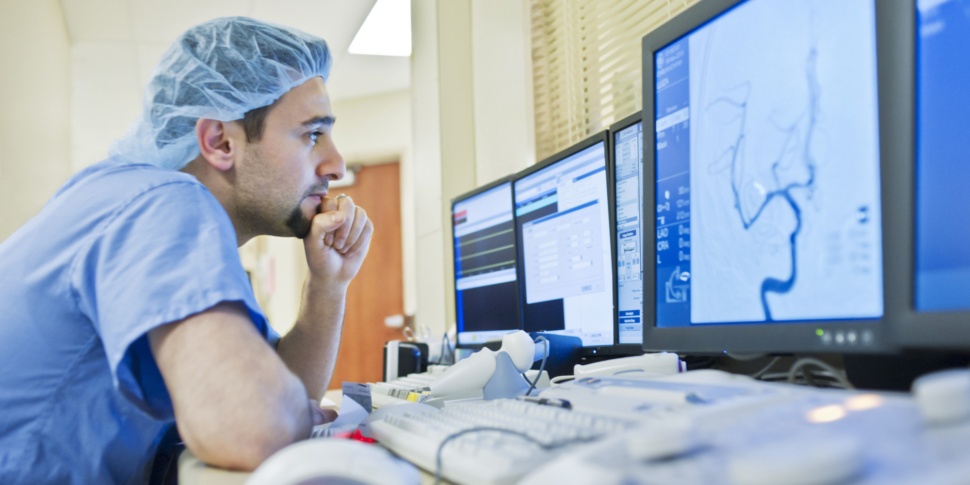Technological advancements within the medical sector have been an ongoing task, especially in recent years and with the advent of the COVID-19 pandemic, getting patients the utmost convenience and care has become a priority. The extra burden created by this pandemic has had the healthcare sectors scrambling to come up with viable solutions to enhance the importance of the quality of the services provided.
According to the global healthcare outlook conducted by Deloitte, the general expenditure on healthcare is predicted to grow by the year 2023. Click here to read the survey about this information. After the pandemic restrictions have been lifted, the software development solutions are also geared to outgrow previous years.
The truth of the matter is that most of the medical sectors have little to no experience working with healthcare software solutions, and healthcare software development is a big part of this mix. Creating software that helps to make life easier for both medical organizations as well as their patients.
What is Healthcare Software Development?
In its simplest definition, healthcare software development includes all of the various activities that can help solve problems within organizations in the healthcare domain. This software encompasses medical equipment providers, clinical services, hospitals, medicine and financing solutions, research and even more niche such as incidental pulmonary nodule software.
The end goal is to increase efficiency and quality and make data more accurate. This means that the innovative solutions may come in different formats from Big Data, machine learning, and e-health all geared towards enhancing the patient experience as well as all equipment involved.
Big Data is defined as information that is too complex or too large to understand through traditional means, such as analysis, data storage, transferring, information privacy and more. Further information about this can be found on this Wikipedia page: https://en.wikipedia.org/wiki/Big_data
Different Classifications of Healthcare Software Development
At the moment there 6 different classifications of this, we discuss them briefly below:
E-Prescribing Software. Pharmacies and patients have most likely used this without knowing what it is. This is the technology that makes possible the transfer and sending of medication prescriptions directly to and from pharmacies and drug stores. Created to not only bring comfort and convenience to patients but also to strengthen the relationship between the healthcare industry and its partners and suppliers.
Hospital Management Software. When it comes to the important things such as administrative work within hospitals and medical institutions as well as assigning insurance and managing patient information, this mix of various technologies bundles up into one, helps make tasks and projects much more organized and easier for staff and members.
Practice Management Software. When the need arises for maintaining clinical workflows, including optimizing everyday operations, this technology is used. The integrated solutions that this care app is capable of help in keeping medical records, managing finances, setting appointments, and also assisting with accounting department tasks.
Urgent Care. Patients must get emergency care without having to visit doctors’ offices, and this application makes this possible.
Electronic Health Record Software. The management and maintenance of patient records electronically can be easily conducted via means of these types of technologies.
All the vital information that doctors usually record on their systems such as patient allergies, medical history, laboratory results, tests, and more, are all done easily and effectively through it. These healthcare software development options, make sharing of data and information between institutions and doctors much easier than having to file everything in folders and boxes, also making paperless technologies possible.
Healthcare CRM. This is a customer management tool that helps strengthen and maintain relationships with clients and doctors. It is capable of producing accurate reports based on performance and contact management, as well as keeping directories up to date.
Why It Is Important to Have Healthcare Software Development
Not only do all of the above make important data readily available but also help in organizing it specifically, and the majority of this software is customizable depending on the criteria and requirements of the medical organizations and institutions. Without them a lot of vital information can get lost in the mix, important information can be miscommunicated and overall productivity levels in and outside of hospitals and centres would be weak.
To provide more accurate information and enable task-oriented solutions, many software development companies seek to establish an eco-system within the healthcare industries through these high-end solutions. What’s good is they can hire their experts to help set these up in various establishments and teach medical staff how to use them in the simplest manner.
It is meant for an array of different clients such as doctors, patients, health control, self-care and clinics alike. It can help better synchronize patient plans, improve the accuracy of treatments, improve the security of essential data as well as control management and meet the ever-growing demand for digital health services globally.
The majority of these applications have data encryption as a security measure and as such, have a high-security level. Getting these implemented in any medical sector, facility or clinic is crucial, especially in circumstances such as these where meeting doctors face-to-face is sometimes impossible.

